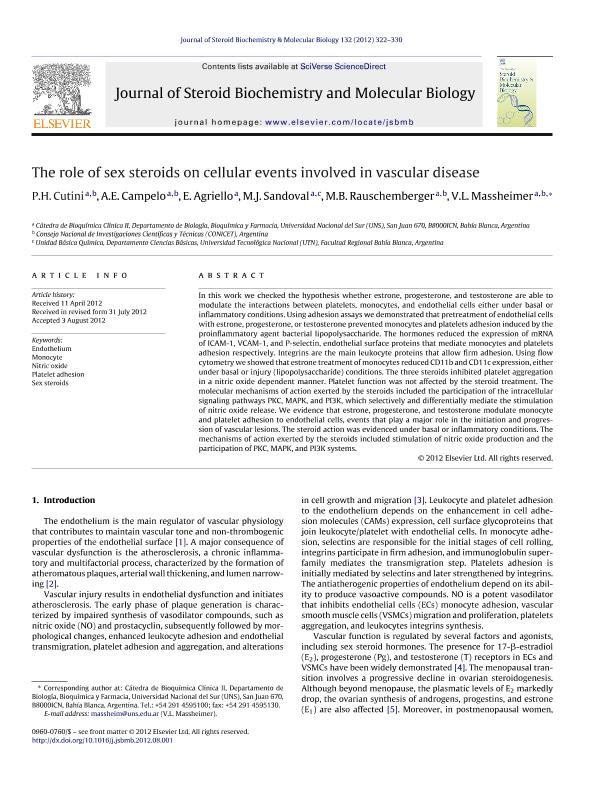Mostrar el registro sencillo del ítem
dc.contributor.author
Cutini, Pablo Hernan

dc.contributor.author
Campelo, Adrián Esteban

dc.contributor.author
Agriello, E.
dc.contributor.author
Sandoval Paz, Myrna Guadalupe

dc.contributor.author
Rauschemberger, María Belén

dc.contributor.author
Massheimer, Virginia Laura

dc.date.available
2019-07-02T21:45:40Z
dc.date.issued
2012-11
dc.identifier.citation
Cutini, Pablo Hernan; Campelo, Adrián Esteban; Agriello, E.; Sandoval Paz, Myrna Guadalupe; Rauschemberger, María Belén; et al.; The role of sex steroids on cellular events involved in vascular disease; Pergamon-Elsevier Science Ltd; Journal of Steroid Biochemistry and Molecular Biology; 132; 3-5; 11-2012; 322-330
dc.identifier.issn
0960-0760
dc.identifier.uri
http://hdl.handle.net/11336/79050
dc.description.abstract
In this work we checked the hypothesis whether estrone, progesterone, and testosterone are able to modulate the interactions between platelets, monocytes, and endothelial cells either under basal or inflammatory conditions. Using adhesion assays we demonstrated that pretreatment of endothelial cells with estrone, progesterone, or testosterone prevented monocytes and platelets adhesion induced by the proinflammatory agent bacterial lipopolysaccharide. The hormones reduced the expression of mRNA of ICAM-1, VCAM-1, and P-selectin, endothelial surface proteins that mediate monocytes and platelets adhesion respectively. Integrins are the main leukocyte proteins that allow firm adhesion. Using flow cytometry we showed that estrone treatment of monocytes reduced CD11b and CD11c expression, either under basal or injury (lipopolysaccharide) conditions. The three steroids inhibited platelet aggregation in a nitric oxide dependent manner. Platelet function was not affected by the steroid treatment. The molecular mechanisms of action exerted by the steroids included the participation of the intracellular signaling pathways PKC, MAPK, and PI3K, which selectively and differentially mediate the stimulation of nitric oxide release. We evidence that estrone, progesterone, and testosterone modulate monocyte and platelet adhesion to endothelial cells, events that play a major role in the initiation and progression of vascular lesions. The steroid action was evidenced under basal or inflammatory conditions. The mechanisms of action exerted by the steroids included stimulation of nitric oxide production and the participation of PKC, MAPK, and PI3K systems.
dc.format
application/pdf
dc.language.iso
eng
dc.publisher
Pergamon-Elsevier Science Ltd

dc.rights
info:eu-repo/semantics/openAccess
dc.rights.uri
https://creativecommons.org/licenses/by-nc-sa/2.5/ar/
dc.subject
Endothelium
dc.subject
Monocyte
dc.subject
Nitric Oxide
dc.subject
Platelet Adhesion
dc.subject
Sex Steroids
dc.subject.classification
Bioquímica y Biología Molecular

dc.subject.classification
Medicina Básica

dc.subject.classification
CIENCIAS MÉDICAS Y DE LA SALUD

dc.title
The role of sex steroids on cellular events involved in vascular disease
dc.type
info:eu-repo/semantics/article
dc.type
info:ar-repo/semantics/artículo
dc.type
info:eu-repo/semantics/publishedVersion
dc.date.updated
2019-06-10T14:21:24Z
dc.journal.volume
132
dc.journal.number
3-5
dc.journal.pagination
322-330
dc.journal.pais
Países Bajos

dc.journal.ciudad
Amsterdam
dc.description.fil
Fil: Cutini, Pablo Hernan. Consejo Nacional de Investigaciones Científicas y Técnicas. Centro Científico Tecnológico Conicet - Bahía Blanca. Instituto de Ciencias Biológicas y Biomédicas del Sur. Universidad Nacional del Sur. Departamento de Biología, Bioquímica y Farmacia. Instituto de Ciencias Biológicas y Biomédicas del Sur; Argentina
dc.description.fil
Fil: Campelo, Adrián Esteban. Consejo Nacional de Investigaciones Científicas y Técnicas. Centro Científico Tecnológico Conicet - Bahía Blanca. Instituto de Ciencias Biológicas y Biomédicas del Sur. Universidad Nacional del Sur. Departamento de Biología, Bioquímica y Farmacia. Instituto de Ciencias Biológicas y Biomédicas del Sur; Argentina
dc.description.fil
Fil: Agriello, E.. Universidad Nacional del Sur. Departamento de Biología, Bioquímica y Farmacia; Argentina
dc.description.fil
Fil: Sandoval Paz, Myrna Guadalupe. Consejo Nacional de Investigaciones Científicas y Técnicas. Centro Científico Tecnológico Conicet - Bahía Blanca. Instituto de Ciencias Biológicas y Biomédicas del Sur. Universidad Nacional del Sur. Departamento de Biología, Bioquímica y Farmacia. Instituto de Ciencias Biológicas y Biomédicas del Sur; Argentina
dc.description.fil
Fil: Rauschemberger, María Belén. Consejo Nacional de Investigaciones Científicas y Técnicas. Centro Científico Tecnológico Conicet - Bahía Blanca. Instituto de Ciencias Biológicas y Biomédicas del Sur. Universidad Nacional del Sur. Departamento de Biología, Bioquímica y Farmacia. Instituto de Ciencias Biológicas y Biomédicas del Sur; Argentina
dc.description.fil
Fil: Massheimer, Virginia Laura. Consejo Nacional de Investigaciones Científicas y Técnicas. Centro Científico Tecnológico Conicet - Bahía Blanca. Instituto de Ciencias Biológicas y Biomédicas del Sur. Universidad Nacional del Sur. Departamento de Biología, Bioquímica y Farmacia. Instituto de Ciencias Biológicas y Biomédicas del Sur; Argentina
dc.journal.title
Journal of Steroid Biochemistry and Molecular Biology

dc.relation.alternativeid
info:eu-repo/semantics/altIdentifier/doi/http://dx.doi.org/10.1016/j.jsbmb.2012.08.001
dc.relation.alternativeid
info:eu-repo/semantics/altIdentifier/url/https://www.sciencedirect.com/science/article/pii/S0960076012001434?via%3Dihub
Archivos asociados
